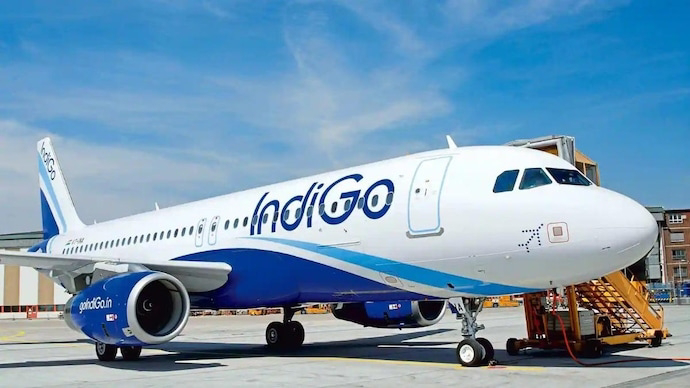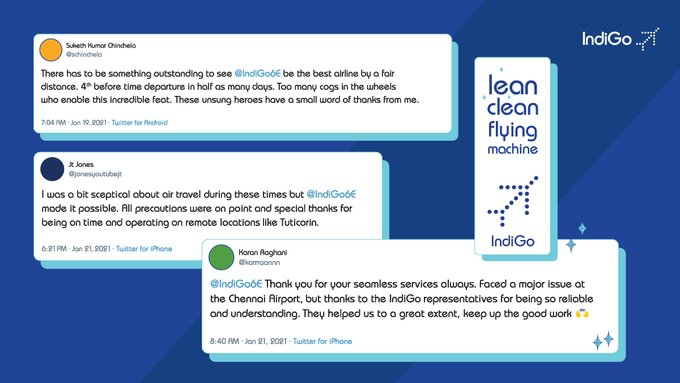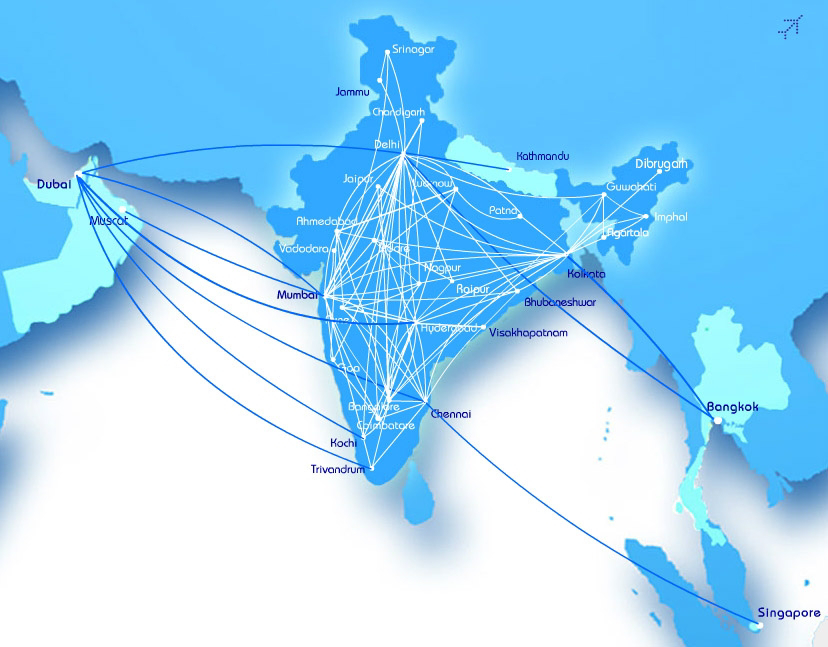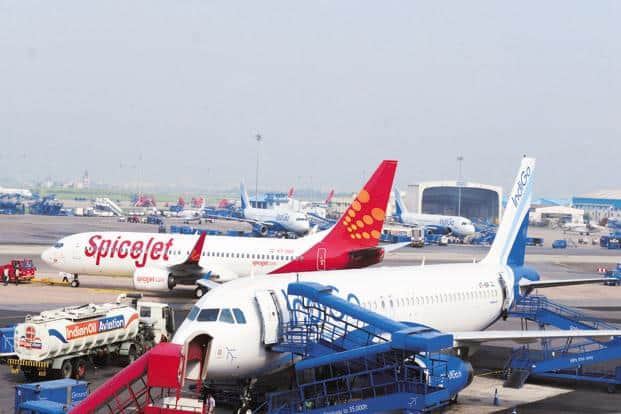Abstract:
This business case study focuses on Indigo Airlines, a leading low-cost carrier in India, and explores its remarkable growth and success in the highly competitive aviation industry. The study highlights the key factors contributing to Indigo's rise to prominence, including its business model, operational efficiency, customer-centric approach, and strategic decision-making. Additionally, it examines the challenges faced by the airline and provides insights into its future prospects.
Introduction:
Indigo Airlines, established in 2006, has emerged as a game-changer in the Indian aviation sector. The airline's relentless focus on providing affordable, reliable, and convenient air travel options has revolutionized the way Indians fly. Indigo's unique business model, exceptional operational efficiency, strong customer service, and strategic decisions have propelled it to become the largest airline in India by market share. This case study analyzes the factors behind Indigo's success and evaluates its future prospects.
Business Model: LCC Redefining Air Travel
Indigo Airlines adopted a low-cost carrier (LCC) business model, which played a significant role in its success. The airline focused on reducing operating costs without compromising safety and quality. It achieved this through various means, including efficient aircraft utilization, single aircraft type (Airbus A320) fleet, high seating density, direct ticket sales, and stringent cost control measures. The LCC model enabled Indigo to offer affordable fares and attract a large customer base.
Operational Efficiency: Punctuality and Streamlined Process
Indigo's operational efficiency has been a cornerstone of its success. The airline's on-time performance, quick turnarounds, and efficient ground operations has set it apart from its competitors. Indigo's strong operational performance is attributed to factors such as simplified fleet maintenance, optimized flight schedules, streamlined check-in and boarding processes, and rigorous training programs for its staff. These efforts have helped Indigo achieve a high level of customer satisfaction and maintain a leading position in the industry.
Customer-Centric Approach: Happy Customers, Loyal Customers
Indigo Airlines has consistently prioritized customer satisfaction, recognizing that happy customers are loyal customers. The airline offers a hassle-free booking experience through its user-friendly website and mobile app, allowing customers to easily search for flights, book tickets, and manage their reservations. Indigo's commitment to providing excellent customer service is evident through its dedicated call center, responsive social media presence, and prompt complaint resolution mechanisms. By consistently delivering on its promise of punctuality and service quality, Indigo has built a strong brand reputation.
Market Expansion and Network Development: Tapping into Oppurtunities
Indigo Airlines strategically expanded its domestic and international network to tap into new markets and capitalize on emerging opportunities. The airline has aggressively added routes, connected underserved destinations, and capitalized on demand from Tier 2 and Tier 3 cities in India. Furthermore, Indigo has leveraged its extensive codeshare agreements with international carriers to enhance its global reach and provide seamless travel options to its customers. These expansion efforts have contributed to Indigo's market dominance and revenue growth.
Cost Optimization Strategies: Maximizing Efficiency
Indigo Airlines has implemented several cost optimization strategies to maintain its competitive edge. The airline negotiates favorable agreements with suppliers, adopts fuel-efficient aircraft, focuses on crew productivity, and implements advanced revenue management systems. By continuously monitoring and reducing costs, Indigo has been able to offer affordable fares while ensuring profitability.
People and Culture: Driving Success through Employees
Indigo's success can be attributed, in part, to its strong emphasis on its people and culture. The airline fosters a high-performance work environment and invests in employee training and development. Indigo's employees are known for their professionalism, discipline, and commitment to delivering exceptional service. The company's leadership team encourages innovation, fosters a collaborative culture, and promotes employee engagement, which has resulted in a motivated and dedicated workforce.
Challenges and Mitigation: Building Resilience
While Indigo Airlines has achieved remarkable success, it has faced its fair share of challenges. The highly competitive nature of the aviation industry, regulatory hurdles, fuel price volatility, and operational disruptions pose ongoing challenges for the airline. However, Indigo has mitigated these challenges by maintaining a strong financial position, implementing robust risk management practices, and adapting its operations to changing market dynamics. The airline's ability to swiftly respond to challenges has contributed to its resilience and continued growth.
Future Prospects: Sustained Growth and Market Leadership
Indigo Airlines is well-positioned to capitalize on the growing Indian aviation market. The airline has a strong brand presence, a loyal customer base, and a proven track record of profitability. As India's middle class continues to expand and air travel becomes more accessible, Indigo can leverage its low-cost model and customer-centric approach to further increase its market share. Moreover, Indigo's focus on sustainability and its gradual adoption of newer, more fuel-efficient aircraft reflect its commitment to environmental responsibility. These factors bode well for the airline's future prospects.
Conclusion:
Indigo Airlines' success story in the Indian aviation industry is a testament to its innovative business model, operational excellence, customer-centric approach, and strategic decision-making. By prioritizing affordability, reliability, and customer satisfaction, Indigo has emerged as a market leader and reshaped the landscape of Indian air travel. With its strong foundation, robust growth strategies, and adaptability, Indigo Airlines is poised to maintain its position as a key player in the industry and navigate future challenges successfully.
Business Lessons:
Here are some key business lessons that can be derived from the success of Indigo Airlines:
1. Focus on Cost Efficiency: Indigo Airlines' low-cost carrier business model highlights the importance of cost optimization in achieving profitability and gaining a competitive edge. By relentlessly focusing on reducing operating costs while maintaining quality and safety, businesses can offer affordable prices to customers and attract a larger market share.
2. Operational Excellence is Crucial: Indigo's emphasis on operational efficiency, on-time performance, and streamlined processes has been instrumental in its success. Investing in operational excellence helps improve customer satisfaction, reduces costs, and enhances overall business performance.
3. Prioritize Customer-Centricity: Indigo's commitment to customer satisfaction has played a pivotal role in building a strong brand reputation and fostering customer loyalty. By prioritizing customer needs, investing in user-friendly interfaces, and providing excellent customer service, businesses can differentiate themselves in competitive markets.
4. Strategic Expansion: Indigo's strategic network expansion, particularly in untapped markets, showcases the importance of identifying growth opportunities and capitalizing on emerging trends. Businesses should conduct thorough market research, analyze demand patterns, and consider expanding into new territories to broaden their customer base.
5. Build a Strong Organizational Culture: Indigo's emphasis on building a high-performance culture, investing in employee training and development, and fostering a collaborative work environment has contributed to its success. Creating a strong organizational culture that aligns with business goals and values can drive employee engagement, innovation, and overall business performance.
6. Agility and Adaptability: Indigo Airlines' ability to adapt to changing market dynamics and swiftly respond to challenges has been a critical factor in its resilience. Businesses must stay agile, monitor industry trends, and proactively adapt their strategies to meet evolving customer demands and overcome obstacles.
7. Financial Resilience: Indigo's focus on maintaining a strong financial position has provided the company with stability during uncertain times. Businesses should prioritize financial management, maintain adequate reserves, and implement risk mitigation strategies to withstand market fluctuations and unforeseen challenges.
8. Sustainability and Social Responsibility: Indigo's gradual adoption of fuel-efficient aircraft and its commitment to sustainability reflect the growing importance of environmental and social responsibility. Incorporating sustainable practices and aligning business strategies with societal needs can enhance brand reputation and attract environmentally conscious customers.
9. Innovation and Technology: Indigo's use of innovative technologies, such as user-friendly websites and mobile apps, has enhanced customer convenience and improved operational efficiency. Embracing innovation and leveraging technology can drive business growth, streamline processes, and create a competitive advantage.
10. Continuous Improvement: Indigo Airlines' success story demonstrates the importance of a relentless pursuit of excellence. By fostering a culture of continuous improvement, businesses can identify areas for enhancement, adapt to changing market demands, and stay ahead of the competition.
These business lessons derived from Indigo Airlines' success can serve as valuable insights for companies across industries, helping them navigate challenges and achieve sustainable growth.














Amazing
ReplyDelete